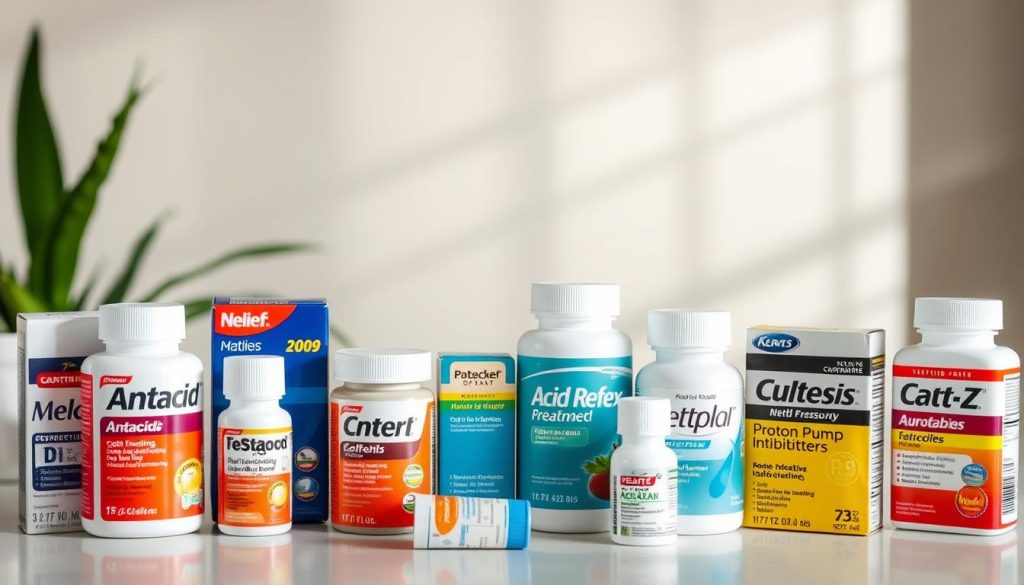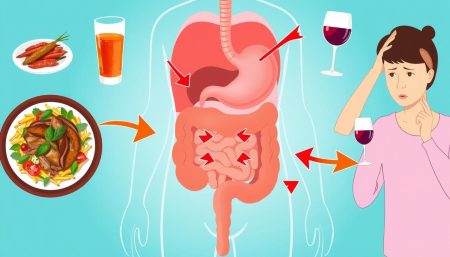Feeling the discomfort of acid reflux can really mess up your day. If you’re looking for acid reflux relief, you’re not alone. This article is here to help with quick and effective steps for acid reflux treatment.
It’s important to listen to your body and know what it’s trying to tell you. Acid reflux sends out clear signals that need attention and understanding. Let’s look at ways to ease the discomfort and improve your digestive health.
Key Takeaways
- Recognizing early signs of acid reflux can help you take prompt action for relief.
- Immediate lifestyle adjustments are a first step toward mitigating acid reflux symptoms.
- Dietary choices have a profound impact on both managing and preventing acid reflux.
- Understanding the balance between home remedies and medical treatments enhances acid reflux treatment efficacy.
- Engaging thoughtfully with your health means considering various options for what to do for acid reflux.
Understanding Acid Reflux and Its Symptoms
Gastroesophageal Reflux Disease, or GERD, and acid reflux are often confused. But knowing the difference helps manage acid reflux symptoms better. GERD is a chronic condition that can lead to serious health problems if not treated.
Defining Acid Reflux and GERD
Acid reflux happens when stomach acid flows up into the esophagus, causing heartburn. GERD is when acid reflux happens more than twice a week or hurts the esophagus. Eating right can help reduce these problems and improve life quality.
Common Symptoms of Acid Reflux
Symptoms of acid reflux include heartburn, regurgitation, and a sour taste in the mouth. Some people also feel like food is stuck in their throat. Knowing these signs is key to managing them well. More information and tips can be found here.
When to See a Doctor
If acid reflux symptoms get worse and more painful, it might be GERD. Seeing a doctor is important to avoid serious problems like Barrett’s esophagus or esophageal cancer. It’s wise to talk to a doctor while making diet changes to get the best care.
Acting fast and making lifestyle changes are key to managing acid reflux and GERD. While diet changes are important, knowing when to see a doctor is crucial. Health experts recommend this approach.
Immediate Actions for Acid Reflux Relief
When acid reflux strikes, quick actions can help. These steps are based on how our bodies react to acid. They are simple yet effective.
Adjusting Your Posture
Changing how you sit or stand can help. Standing up straight or sitting upright keeps acids where they belong. This stops them from moving up and causing discomfort.
Chewing Gum to Increase Saliva
Chewing gum makes more saliva. Saliva is a natural way to fight acid reflux. It helps protect the esophagus from acid irritation.
Loosening Clothing to Relieve Pressure
Tight clothes can make acid reflux worse. By loosening belts and waistbands, you can ease pressure. This helps prevent more discomfort.
| Action | How It Helps | Effectiveness |
|---|---|---|
| Adjust posture | Prevents acid from escaping the stomach | High |
| Chew gum | Increases saliva to neutralize acid | Medium to High |
| Loosen clothing | Reduces abdominal pressure | Medium |
These actions are great for quick relief. Using them together can make a big difference. They help manage acid reflux symptoms effectively.
Dietary Adjustments for Acid Reflux Management
Learning about the acid reflux diet is key for managing symptoms. It starts in the kitchen and at the table. Choosing the right foods and eating habits can greatly help those with acid reflux.
Foods to Avoid When Managing Acid Reflux
Knowing and avoiding trigger foods is a big step. Some foods make acid reflux worse by raising stomach acid or relaxing the esophageal sphincter. This lets acid flow into the esophagus.
- Fatty and fried foods
- Spicy dishes
- Acidic fruits like oranges and tomatoes
- Chocolate
- Caffeinated and carbonated beverages
- Alcohol
Adopting an acid reflux diet that cuts down on these foods helps manage discomfort and reduce episodes.
Meals Planning and Eating Habits
How and when you eat is crucial for controlling acid reflux. Mindful eating can greatly improve your digestive health.
| Strategy | Description | Benefit |
|---|---|---|
| Eat smaller, more frequent meals | Avoid large meals that overfill the stomach | Reduces pressure on the digestive system |
| Avoid eating close to bedtime | Finish eating 2-3 hours before lying down | Prevents acid from traveling back into the esophagus |
| Stay upright after meals | Maintain a sitting or standing posture | Utilizes gravity to keep stomach acids down |
By adjusting your eating habits, you can lessen symptoms and improve digestion.
Acid Reflux Remedies and Over-The-Counter Solutions
Looking for quick acid reflux relief? There are many over-the-counter options. They help with symptoms and manage acid reflux over time. Knowing which medications work best can help you find lasting relief and cut down on acid reflux episodes.
Antacids and Their Effects
Antacids are a top choice for acid reflux remedies. They neutralize stomach acid, easing heartburn and indigestion. Ingredients like magnesium hydroxide, calcium carbonate, and aluminum hydroxide are common. But, they’re not for long-term use since they don’t fix the root cause of acid reflux.
H2 Blockers and Proton Pump Inhibitors
H2 blockers and proton pump inhibitors (PPIs) target acid reflux more directly. H2 blockers, like ranitidine and famotidine, cut down stomach acid production. PPIs, such as omeprazole and esomeprazole, block acid-making enzymes for longer relief.
Both H2 blockers and PPIs are good for acid reflux relief. But, always talk to a doctor before starting them. This helps avoid side effects and ensures they’re part of a full acid reflux management plan.

Lifestyle Changes to Prevent Acid Reflux
Making lifestyle changes is key to preventing acid reflux. These changes improve your health and target acid reflux causes. Let’s explore important changes that can help reduce acid reflux episodes.
Maintaining a Healthy Weight
Keeping a healthy weight is vital for acid reflux prevention. Extra weight, especially around the stomach, puts pressure on the stomach. This can cause stomach acid to flow back up into the esophagus. Studies show that managing weight can greatly reduce acid reflux symptoms.
Smoking Cessation and Acid Reflux
Quitting smoking is a recommended lifestyle change for acid reflux prevention. Smoking weakens the lower esophageal sphincter, which should keep stomach acid out of the esophagus. Tobacco use worsens acid reflux, making quitting crucial.
Importance of Exercise for Digestive Health
Regular exercise is important in fighting acid reflux. It helps with weight management and boosts the digestive system. It also reduces stress, which can trigger acid reflux. However, choose low-impact exercises to avoid increasing abdominal pressure.
- Attention to diet – avoid trigger foods like spicy, fatty, or extremely acidic products.
- Regular health check-ups to monitor symptoms and progress.
- Stress reduction techniques like meditation or yoga which indirectly affect reflux by lowering stress levels.
The connection between lifestyle changes and acid reflux prevention is crucial. By changing daily habits and focusing on health, you can reduce acid reflux symptoms. This can greatly improve your quality of life.
What to Do for Acid Reflux: Natural Remedies for Quick Comfort
Many people look for quick fixes when acid reflux hits. Natural remedies for acid reflux offer relief without drugs. Learning what to do for acid reflux naturally helps symptoms and improves digestion.
Changing your diet is key to managing acid reflux naturally. Herbal teas like ginger and chamomile can calm your stomach. Adding foods like bananas and melons to your diet can also help balance your stomach’s acid.
- Avoid trigger foods: Foods like spicy dishes, chocolate, citrus fruits, and caffeinated drinks can make acid reflux worse.
- Chew gum: Gum makes your mouth produce more saliva, which can help neutralize stomach acid.
- Elevate the head during sleep: Sleeping with your head higher than your stomach can stop acid from flowing up.

Mindfulness and relaxation can also help. Stress makes acid reflux symptoms worse. Practices like deep breathing or yoga can help your mind and stomach.
| Remedy | Benefits | Usage Tips |
|---|---|---|
| Apple Cider Vinegar | May help balance stomach acidity | Dilute a tablespoon in water before meals |
| Baking Soda | Acts as a natural antacid | Mix a teaspoon in a glass of water and drink sparingly |
| Aloe Vera Juice | Soothes the gastrointestinal tract | Drink a small amount before meals |
Using these natural remedies can greatly reduce discomfort and improve your life. But, always talk to a doctor before trying new treatments, especially if your symptoms are bad or happen often.
Navigating Acid Reflux Treatment Options
Looking for relief from acid reflux discomfort? It’s key to know the different treatment options. We’ll look at both traditional and natural ways, and when surgery might be needed.
Conventional Medicine vs. Holistic Approaches
Traditional medicine offers antacids, proton pump inhibitors, and H2 blockers for quick relief. But, holistic methods focus on diet and lifestyle changes. They include eating less acidic foods, managing stress, and using herbs like ginger and chamomile.
When to Consider Surgery for Acid Reflux
If symptoms don’t improve with lifestyle and medication, surgery might be an option. Procedures like fundoplication wrap the stomach around the esophagus to prevent acid reflux. This is for those with severe damage or when meds don’t work.
Here’s a table to compare traditional and holistic treatments:
| Treatment Approach | Description | Pros | Cons |
|---|---|---|---|
| Conventional Medicine | Includes pharmaceuticals like antacids, H2 blockers, and proton pump inhibitors. | Quick symptom relief, high efficacy | Possible side effects, temporary relief |
| Holistic Approaches | Focuses on dietary adjustments, stress management, and natural supplements. | Low side effects, promotes overall well-being | Requires lifestyle change, slower onset of relief |
| Surgical Methods | Procedures like fundoplication where the stomach is wrapped around the esophagus. | Long-term solution, high success rate | Invasive, potential complications |
Each treatment has its own benefits and drawbacks. It’s crucial to find what works best for you. Whether it’s quick relief with meds, a holistic lifestyle, or surgery, choose what fits your health needs and doctor’s advice.
Home Remedies for Acid Reflux: Do They Work?
Looking into acid reflux home remedies shows many natural options that work well. We’ll explore how baking soda and herbal teas can help, looking at their practical use and science behind them. It’s interesting to see if these natural remedies for acid reflux really help.
Baking Soda and Water Mixture
Baking soda is a simple, affordable fix for heartburn, a key acid reflux symptom. It’s basic and can neutralize stomach acid, giving quick relief. Just mix a teaspoon of baking soda in water and drink it. But, don’t overdo it, as too much can raise sodium levels.
Herbal Teas for Soothing the Esophagus
Herbal teas like ginger, chamomile, or licorice can calm the esophagus and ease acid reflux. They have anti-inflammatory properties that lessen digestive tract irritation. Ginger tea, in particular, soothes and aids digestion, making it great for acid reflux.

The table below compares the benefits and cautions of using baking soda and herbal teas for acid reflux:
| Remedy | Key Benefits | Usage Tips | Precautions |
|---|---|---|---|
| Baking Soda | Quick relief from heartburn | Dissolve 1 tsp in water | Use sparingly to avoid high sodium intake |
| Ginger Tea | Promotes digestion, anti-inflammatory | Consume 1-2 cups daily | Monitor effects if pregnant or on medication |
| Chamomile Tea | Reduces stomach acidity, anti-inflammatory | Sip before bedtime | Avoid if allergic to daisy family plants |
| Licorice Tea | Soothes esophagus, enhances mucous production | Drink as needed | Check for high blood pressure issues |
In summary, acid reflux home remedies like baking soda and herbal teas can help. But, it’s important to know their effects and limits. They can be part of a full treatment plan, as advised by doctors.
The Role of Acid Reflux Diet in Managing Symptoms
An effective acid reflux diet is key to managing acid reflux symptoms. Knowing what to do for acid reflux and using acid reflux remedies in your diet can help a lot. This can make symptoms less frequent and less severe.
The Best Foods to Eat for Acid Reflux
Eating foods that are easy on the stomach can help. Foods high in fiber, like oatmeal, bananas, and green veggies, are great for an acid reflux diet.
How a Proper Diet Can Limit Occurrences
Knowing what to do for acid reflux is more than just picking foods. It’s about eating a balanced diet that helps your digestion. Eating foods that are alkaline, like melons and cucumbers, can help neutralize stomach acid and lower acid reflux episodes.
| Food Category | Examples | Benefits |
|---|---|---|
| High Fiber Foods | Oatmeal, Apples, Carrots | Helps absorb excess acid and improve digestion |
| Alkaline Foods | Melons, Cauliflower, Fennel | Neutralizes stomach acid |
| Watery Foods | Cucumber, Lettuce, Broth-based soups | Helps dilute and flush out stomach acid |
Following an acid reflux diet is more than just avoiding bad foods. It’s about living a lifestyle that supports your digestive health. With the right acid reflux remedies, like smart food choices, you can better manage your symptoms and live a healthier life.
Understanding the Link Between Stress and Acid Reflux
It’s important to understand how stress affects acid reflux. Stress can make acid reflux symptoms worse. Finding ways to manage stress is key to feeling better and preventing acid reflux.
Stress Management Techniques
Managing stress is crucial for reducing acid reflux. Here are some effective ways to do so:
- Mindfulness Meditation: Regular practice can reduce the stress that often triggers acid reflux.
- Structured Exercise: Physical activity helps lower stress levels, which can be crucial for preventing acid reflux.
- Adequate Sleep: Ensuring sufficient sleep each night can help manage stress, reducing episodes of acid reflux.
Relaxation Practices for Digestive Health
Relaxation techniques can greatly improve digestive health. They help soothe the digestive system and reduce acid reflux flare-ups caused by stress.
- Yoga: Certain poses can improve gastrointestinal health and reduce acid reflux symptoms.
- Progressive Muscle Relaxation: This technique involves tensing and relaxing muscles, promoting overall relaxation and aiding digestion.
- Guided Imagery: Focusing on calming images can decrease stress and potentially alleviate the severity of acid reflux.
Conclusion
We’ve looked at ways to find relief from acid reflux, treatment options, and how to prevent it. Managing acid reflux needs a mix of quick fixes, lifestyle changes, and diet plans. Knowing what triggers your acid reflux is key to treating it well.
Making healthy lifestyle choices like keeping a healthy weight and exercising regularly helps your digestion. Avoiding foods that make symptoms worse and using natural remedies can also help. It’s important to treat acid reflux and take steps to prevent it too.
The fight against acid reflux is personal but we’re all in it together. What works for one person might not work for another. But the goal is the same: to live comfortably and feel well. With the right information, support, and actions, you can take back your comfort and improve your life.
FAQ
Q: What immediate actions can provide relief from acid reflux?
A: To ease acid reflux, sit up straight. Chew gum to make more saliva and neutralize acid. Also, loosen tight clothes to ease stomach pressure.
Q: How can diet affect acid reflux symptoms?
A: Some foods can trigger acid reflux. Avoid fatty, acidic, or spicy foods. Eat smaller meals often and skip late-night snacks.
Q: Are there any natural remedies for acid reflux?
A: Yes, natural remedies like ginger, chamomile tea, and apple cider vinegar can help. But, their effects vary for everyone.
Q: What lifestyle changes can help prevent acid reflux?
A: To prevent acid reflux, stay at a healthy weight. Quit smoking and avoid trigger foods. Regular exercise helps digestion.
Q: When should I consider over-the-counter acid reflux medications?
A: Try over-the-counter meds like antacids or H2 blockers if natural remedies don’t work. Always talk to a doctor before starting new meds.
Q: What are common symptoms of acid reflux?
A: Signs of acid reflux include heartburn and a burning chest or throat. You might also feel like food is coming back up. Difficulty swallowing and chest pain are also symptoms.
Q: Can stress management techniques improve acid reflux?
A: Yes, stress can worsen acid reflux. Techniques like mindfulness and meditation can help manage stress and reduce reflux episodes.
Q: What is the difference between acid reflux and GERD?
A: Acid reflux happens when stomach acid flows back into the esophagus. GERD is a more serious version that causes inflammation in the esophagus and happens often.
Q: How does smoking cessation impact acid reflux?
A: Smoking weakens the esophageal sphincter, making acid reflux worse. Quitting smoking can help symptoms and improve esophageal health.
Q: What dietary adjustments should I consider for acid reflux management?
A: Avoid foods like citrus, tomatoes, and chocolate. Eat smaller meals and don’t lie down after eating.
Q: When is surgery for acid reflux considered?
A: Surgery might be needed if other treatments don’t work. It’s also considered for severe cases like esophagitis or Barrett’s esophagus.
Q: Can herbal teas help soothe acid reflux?
A: Yes, teas like chamomile, ginger, and licorice can soothe the esophagus. But, avoid teas with caffeine or mint as they can make symptoms worse.

















